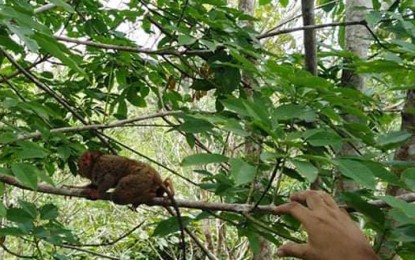
PHILIPPINE TARSIER. One of the two rescued tarsiers crawls on a tree trunk after personnel of the Community Environment and Natural Resources Office (CENRO)-Liloy released them back to their natural habitat Wednesday (March 2, 2022) in Barangay Delucot, Godod, Zamboanga del Norte. The tarsiers were retrieved on the same day by CENRO-Liloy personnel who responded to a social media report regarding the capture of the nocturnal mammals in the area. (Photo courtesy of CENRO-Liloy)
ZAMBOANGA CITY – The Department of Environment and Natural Resources – Zamboanga Peninsula (DENR-9) has released a pair of Philippine Tarsiers back to its natural habitat in the province of Zamboanga del Norte.
DENR-9 information officer Rosevirico Tan said Thursday the tarsiers were released by the personnel of Community Environment and Natural Resources Office (CENRO)-Liloy in the forest of Barangay Delucot, Godod, Zamboanga del Norte.
Tan said the tarsiers were retrieved Wednesday by a team of personnel from CENRO-Liloy who responded to a social media report regarding the capture of two tarsiers in Delucot village.
“Upon assessment, the pair were found to be in good and healthy condition and were released back to its natural habitat on the same day,” Tan said.
Philippine tarsiers are often seen in small groups - up to five together in one place - but are considered as solitary animals.
“These nocturnal mammals are very sensitive and are known to die or commit suicide when held in captivity,” Dionisio Rago, CENRO-Liloy chief, said in a statement.
Rago urged the public to immediately report any wildlife concerns to them through hotline 0948-147-12-50 for the proper handling and retrieval operations.
Tan said Thursday's release of the two tarsiers was timely as the DENR is celebrating World Wildlife Day.
The celebration of World Wildlife Day aims to raise awareness of the multitude of benefits that their conservation provides to humans.
The Philippine tarsier, locally known as “Basing,” is classified by the International Union of Conservation of Nature (IUCN) as near threatened species due to a significant decrease of its population.
They are protected under Republic Act 9147 otherwise known as the Wildlife Resources Act, which prohibits any person from hunting, hurting, killing, maiming, or keeping them as pets. (PNA)
